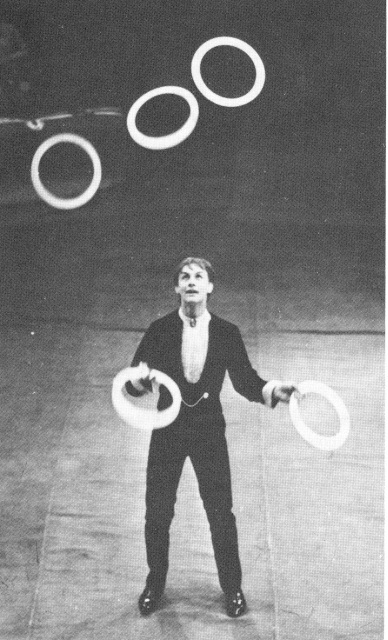
Sergei Ignatov with five ring pancakes in 1975. |
Page 21 Winter 1990 - 91
|
All
his life my grandfather strove towards things natural, simple and
real. It was probably for this reason that he loved horses. He
understood that it's easier to transform an illness than to heal it,
and his horses were always pure, fulfilling and wellgroomed. He
had a sharp village wit towards everything: to the qualities of
people, towards his
understanding of the circus and in his knowledge of horses. He
taught a monkey to perform tricks. In a month and a half
he taught a homeless dog found at a market to do somersaults
and walk on its front and hind
legs. In short, to bring
out all the God-given abilities which a dog has. And many of
these animals, wagging their tails, had the opportunity to see
the astonishing streets of New York or Paris.
My
grandfather had one system - work. For 50 years, day after day, he
appeared at the training ring at six in the morning and only at
seven at night did he bid the horses good night. I at once
understood how difficult it was to train animals. I slept by the
training ring and also rose each morning, not without my
grandfather's help, at six. His first word was always
"rehearse." We had breakfast and I rehearsed and rehearsed
and rehearsed. My grandfather taught me how to work.
At
the end of August, after three months of "rest," I
returned home full of memories of the circus. I was like a wrung-out
lemon but I already felt that I would be a juggler.
It's ten minutes before ten. Coming up to the circus I see our Russian wolfhounds running merrily on the new-fallen snow. The circus in the morning looks quiet and half asleep. In a few windows the lights are still burning. I walk into the hall and right away start to rehearse.
In
the circus school or in the studios I often hear a teacher tell a
student: "Stand up straight."
In
the four years of my best technical juggling I practiced ballet every
day. If the classes went well then my overall body tone and vigour
rose. I could sense an overall lightness and a readiness to rehearse.
The productivity of a rehearsal depends not only on the rehearsal
itself but also on the ability to prepare the entire body down to the
smallest cell in it. A half-hour rest. Juice, fruits and nuts - and
once again I go back into the ring.
The second year at the State Circus School. I'm now in the juggling group, in all honesty by chance. During the entire first year I had problems with my legs and it was clear that I wouldn't make an acrobat. "Where will you go?" asked everyone. "Into juggling."
The routine weekdays of school life began. Teachers and trainers thought for us and our heads were used for balances and to balance balls. With real emotions we studied our abilities and everything we saw, and we absorbed it as if drinking it in; accumulating it in the prospect of appearing, in four years time, on the stages of the student circus. While I was not yet among the jugglers but still in the company of acrobats, I found I was the worst in the class. My legs always hurt and I wondered why had I dreamed of being an acrobat. It was necessary as soon as possible to re-assess my future. An enormous amount of time spent practicing during summers and on holidays had come to naught. I knew what the results of the assessors would be, but nevertheless, when I heard the negative results I was very disappointed at having lost my dreams.
As
"greenhorns" the instructors had told us "it's
difficult to tell what's wheat and what's chaff." Now the second
year is finished. |

Sergei Ignatov with five ring pancakes in 1975. |